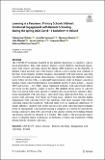Files in this item
Learning in a pandemic : primary school children’s emotional engagement with remote schooling during the Spring 2020 Covid-19 lockdown in Ireland
Item metadata
| dc.contributor.author | Chzhen, Yekaterina | |
| dc.contributor.author | Symonds, Jennifer | |
| dc.contributor.author | Devine, Dympna | |
| dc.contributor.author | Mikolai, Julia | |
| dc.contributor.author | Harkness, Susan | |
| dc.contributor.author | Sloan, Seaneen | |
| dc.contributor.author | Martinez Sainz, Gabriela | |
| dc.date.accessioned | 2022-02-21T15:30:11Z | |
| dc.date.available | 2022-02-21T15:30:11Z | |
| dc.date.issued | 2022-02-12 | |
| dc.identifier | 277679578 | |
| dc.identifier | e8cb4102-0a21-465d-9083-68ecc2b5427e | |
| dc.identifier | 85124750485 | |
| dc.identifier | 000754333800001 | |
| dc.identifier.citation | Chzhen , Y , Symonds , J , Devine , D , Mikolai , J , Harkness , S , Sloan , S & Martinez Sainz , G 2022 , ' Learning in a pandemic : primary school children’s emotional engagement with remote schooling during the Spring 2020 Covid-19 lockdown in Ireland ' , Child Indicators Research , vol. First Online . https://doi.org/10.1007/s12187-022-09922-8 | en |
| dc.identifier.issn | 1874-8988 | |
| dc.identifier.other | ORCID: /0000-0002-7733-6659/work/108918714 | |
| dc.identifier.uri | https://hdl.handle.net/10023/24917 | |
| dc.description | Open Access funding provided by the IReL Consortium. This study was funded by UK Research and Innovation-Economic and Social Research Council and the Irish Research Council under the ‘ESRC-IRC UK/Ireland Networking Grants’. The Children’s School Lives study, on which this analysis is based, is conducted by University College Dublin and funded by the National Council for Curriculum and Assessment through a grant awarded to Dympna Devine, Jennifer Symonds, Senaeen Sloan, and Gabriela Martinez Sainz. | en |
| dc.description.abstract | The COVID-19 pandemic resulted in the greatest disruption to children’s schooling in generations. This study analyses primary school children’s emotional engagement with remote schooling during the Spring 2020 lockdown in the Republic of Ireland, which involved one of the longest school closures among rich countries at the time. It investigates whether children’s engagement with their remote schooling varied by personal and family characteristics, using data from the Children’s School Lives (CSL) surveys. CSL is a nationally representative study of primary schools in Ireland, which collected information from children aged 8–9 years in May – August 2019 and in May – July 2020. Linear regression estimates with school fixed effects are based on the analytic sample of nearly 400 children (from across 71 schools) who took part in both waves and have complete data on all the key variables. Emotional engagement with schooling is measured using child-reported items on satisfaction with schooling. Everything else being equal, children who reported higher engagement with schooling before the pandemic were more engaged with remote schooling during the lockdown. Although there were no significant differences by family affluence, children with greater resources for home schooling reported higher levels of engagement. This includes having a computer or a laptop for schoolwork, having someone to help with schoolwork if the child is worried about falling behind, and having schoolwork checked by a teacher. This points to the paramount importance of adequate digital technologies in the home as well as the availability of help during periods of remote schooling. | |
| dc.format.extent | 22 | |
| dc.format.extent | 894284 | |
| dc.language.iso | eng | |
| dc.relation.ispartof | Child Indicators Research | en |
| dc.subject | COVID-19 | en |
| dc.subject | School closures | en |
| dc.subject | Remote schooling | en |
| dc.subject | Engagement with schooling | en |
| dc.subject | Ireland | en |
| dc.subject | L Education (General) | en |
| dc.subject | H Social Sciences (General) | en |
| dc.subject | 3rd-DAS | en |
| dc.subject.lcc | L1 | en |
| dc.subject.lcc | H1 | en |
| dc.title | Learning in a pandemic : primary school children’s emotional engagement with remote schooling during the Spring 2020 Covid-19 lockdown in Ireland | en |
| dc.type | Journal article | en |
| dc.contributor.institution | University of St Andrews. School of Geography & Sustainable Development | en |
| dc.contributor.institution | University of St Andrews. Population and Health Research | en |
| dc.contributor.institution | University of St Andrews. Geographies of Sustainability, Society, Inequalities and Possibilities | en |
| dc.identifier.doi | https://doi.org/10.1007/s12187-022-09922-8 | |
| dc.description.status | Peer reviewed | en |
This item appears in the following Collection(s)
Items in the St Andrews Research Repository are protected by copyright, with all rights reserved, unless otherwise indicated.

